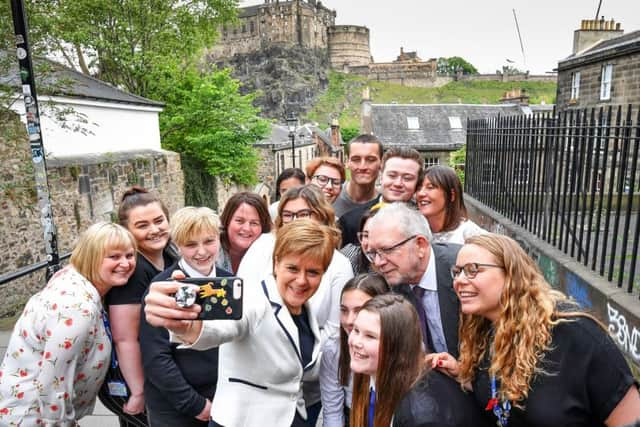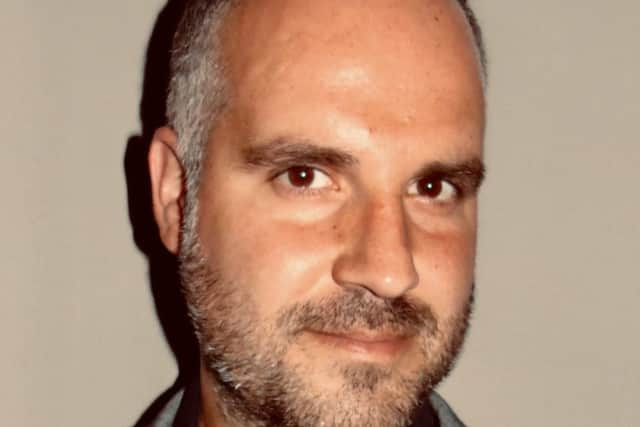Threat to Scotland’s new Citizens’ Assembly leaves top adviser ‘fuming’
Dr Oliver Escobar, who is expected to be a lead researcher on the body, also raised concerns about the boycott of the body by the Tories and Liberal Democrats and urged them to rethink their opposition.
It came as one of the architects of the Citizens’ Assemblies in Ireland warned that there is a “serious risk” the Scottish process could be undermined without involvement from all the main political parties at Holyrood.
Advertisement
Hide AdAdvertisement
Hide AdEscobar has advised Constitution Secretary Michael Russell on the formation of the body in Scotland as part of the Centre on Constitutional Change. And he told Scotland on Sunday he was “fuming” at recent claims by Nationalist MP Joanna Cherry, who said she believed the Assembly will be the “perfect way to move Scotland on from the current state of Brexit paralysis, created by Westminster, and to move us towards independence”.


Escobar, who will share a platform with Cherry at an Electoral Reform Society event on the proposed Assembly in Edinburgh tomorrow, said her comments will make its work “ten times harder”.
“I’m kind of fuming around that,” he said.
The open-minded and unbiased approach is the “fundamental underpinning of the legitimacy of this body,” he added.
“I wouldn’t be involved in advising, and hopefully soon to be confirmed in doing research around this, if I believed that this was an already forgone conclusion.


“So earlier this week when comments were made by a very prominent member of the SNP, it was perhaps the most unhelpful contribution that has been made so far to this process. I understand why this happens – it happens because they’re talking to their own supporters, they frame it in a way that is appealing to them. But it completely goes against the ethos.
“The person who made these comments has actually nothing to do with the Citizens’ Assembly. She’s not involved in organising it, she’s not involved in any of the advisory boards. She’s just someone who has advocated for Citizens’ Assemblies because she’s been inspired by the Irish example.”
The Scottish Government has insisted that independence from politicians will be one of its core principles, with a separate secretariat and stewarding board, along with the co-chairs David Martin, the ex-Labour MEP and a female counterpart. The broad task set out by Nicola Sturgeon does not explicitly mention independence, but calls on it to consider the kind of country Scots are seeking to build, dealing with the challenges of Brexit and the work needed to help Scots make “informed choices” about their future.
The proposed 120-strong body will comprise randomly selected members of the public, but has faced early problems after the Tories and Liberal Democrats announced they would not be taking part, claiming it is a nationalist ploy to further the cause of independence.
Advertisement
Hide AdAdvertisement
Hide AdProfessor David Farrell of University College Dublin was research director of the Constitutional Convention in Ireland, the forerunner to its Citizens Assembly on which he was also the designated research director.
He said: “I think there’s a serious risk if there isn’t some buy-in from most of the parties that it could undermine it. That’s a serious risk.
“In both of the Irish processes, pretty much all of the parties were able to buy-in – and in some cases quite reluctantly in the beginning. But I think that was so important. You can see it with social media commentary already that there are people who are seeing this as a stitch-up which is what you get early on. The best way to reduce that criticism is to say ‘Look, we have some buy-in from all parties.’
And the success of the body depends on it being viewed as independent and objective, said Farrell.
“It is crucially important,” he added. “We had much the same when we were talking about abortion because that would have been similarly an extremely controversial topic.
“So what’s really important is that it’s seen to be independent, objective, fully transparent.”
The need for cross-party support was one of the key factors emphasised to the Scottish Government in advice from experts.
Escobar is an expert in public policy at Edinburgh University who has worked on smaller citizens’ assembly-style bodies for years
Advertisement
Hide AdAdvertisement
Hide Ad“I made a very strong case to the minister, to Mike Russell, about building cross-party support for this,” he said.
“Sometimes it’s not possible to get everyone on board. If the process is properly designed and all the checks and balances and guarantees that we want to build into it from the research side of things are in place, then what tends to happen is that people come on board.”
And he appealed to the Tories and Lib Dems leadership in Scotland to rethink their opposition.
“I’m hoping they might still be brought in if they are persuaded that the process is valid and fair,” he said. “They should be part of the cross-party oversight group that needs to be formed. ”
But the involvement of Labour and the Greens, as well as the SNP, will help the Assembly’s credibility. “It’s not a single party situation but it could be better.”
Citizens’ Assemblies are part of a “broader family” of innovations known as “mini publics”, according to Escobar.
Smaller-scale versions have been in used in Scotland to gauge views on health and social care when citizens’ juries were used, while the Christie Commission into public services a decade ago also included a “mini public” to help it proceed.
“It’s supposed to be a reflection of a cross section of the population and therefore some people will not be neutral – otherwise it would be wrong as you just include the moderates or the neutrals,” Escobar added.